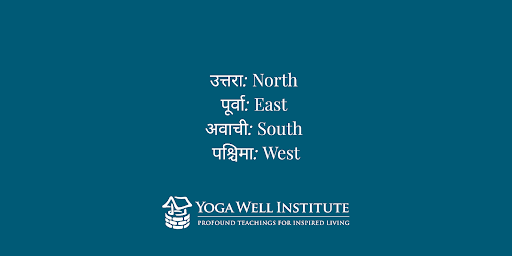Guest blog by Carrie Heeter, PhD, Professor Emeritus, Michigan State University |
Yoga Philosophy in Daily Life: Treasure Hunters
In Indiana Jones movies actor Harrison Ford plays Dr. Jones—an archeologist and part-time anthropologist searching for ancient treasure. When I participate in a year-long online Yoga Well class delving into an ancient Yoga philosophy text, I imagine Chase Bossart (the teacher) as Dr. Jones.
The ancient writings are in Sanskrit. They are organized into chapters of concise “sūtras” or “ślokas” (depending on the text)—nuggets of cryptic wisdom that construct a coherent philosophy from a distant culture. Along with the Sanskrit we are given a word-for-word literal translation. A slightly longer explanation untangles the archaic syntax to translate overall meaning, not just individual words. Finally, there may be commentary by a different revered Indian sage—perhaps also written in Sanskrit.
That is where the journey of understanding begins, each sūtra a fragment of a systematic collection of ideas explaining how mind, body, spirit, and the world operate. The framework prescribes a path to equanimity.
Like a shard of pottery unearthed at an archeological dig, the importance and value of a sūtra is not initially obvious. Chase unpacks the context within and across chapters, elaborates on the meaning, and uses examples from his own and students’ experiences to reveal the sūtras’ relevance to modern daily life.
Yoga Philosophy is Unique to You: What treasure do we seek?
Hindu mythology depicts Patañjali (author of the Yogasūtras) as a divine serpent with a thousand heads who descended to Earth to teach Yoga to humanity. Each head offers an interpretation and application of the sūtras adapted to the needs, abilities, and circumstances of an individual.
Most students are not taking the class to memorize the sūtras or to be able to pass a test. Just like how and why you do a personal yoga practice, your reasons for being part of an ongoing Yoga philosophy class are unique to you. The understandings, insights, and other benefits you receive will be unique to you.
Here are some questions that motivate studying Yoga philosophy: who am I? Why do I feel and act the way I do? How can my life be better? How do I learn to listen to my inner voice? How do I become my most authentic self? How can I be more present? How do I find peace? How do these sutras relate to what I have learned in other yoga traditions, in books, and in life?
In studying the sūtras we deepen our connection with Yoga. I call upon “the yogis who have come before me” when I consider what to teach in an upcoming meditation. Studying Yoga philosophy strengthens my sense of their lives, beliefs, and practices.
Yoga Philosophy and Heritage: The ancient Yoga texts were written by our Yoga ancestors


Ancient Yoga philosophy texts are not artifacts from a lost civilization. Distant? Yes. Lost? No. The sūtras encapsulate the origin and foundations of modern yoga. As devoted practitioners of Viniyoga and meditation, these texts illuminate our Yoga heritage.
My family tree and my DNA confirm my biological ancestors came from Northern Europe. My yoga ancestors include Patañjali—who wrote down the Yogasūtras more than 2000 years ago. My Yoga ancestors (and yours) were Indian. I revere this connection.
The wisdom of Yoga is passed orally from guru to disciple, from teacher to student. Chase was a long time student of Mr. TKV Desikachar. Mr. Desikachar was both son and long-time student of Sri Krishnamacharya.
We become part of this transmission process that extends back thousands of years. It’s a gift to be part of this chain. Chase teaches us what his teacher taught him, based on what his teacher’s teacher was taught.
Chase starts and ends classes with a chant, honoring where what we study and practice came from. When he answers a question or offers an explanation he will often begin by saying “this is what I was given” or “this is what I was taught”.
In these classes, wisdom is being shared with us. We too might someday say to others “this is what I was given”.
Looking for more?
Do you feel ready to explore Yoga Philosophy? Find Yoga Philosophy Courses with Yoga Well Institute on the Yoga Well Archives and begin uncovering your unique treasure.

Carrie Heeter, PhD, RYS200
Carrie Heeter, PhD, RYS200, is a meditation designer, research scientist, and author of the book An Inside Look at Meditation: Experiences for healing, support, and transformation. She has studied yoga one-on-one with her mentor Marcel Allbritton and participated in Yoga Well courses and trainings for more than a decade. She is a retired professor of interactive media and serious games at Michigan State University



